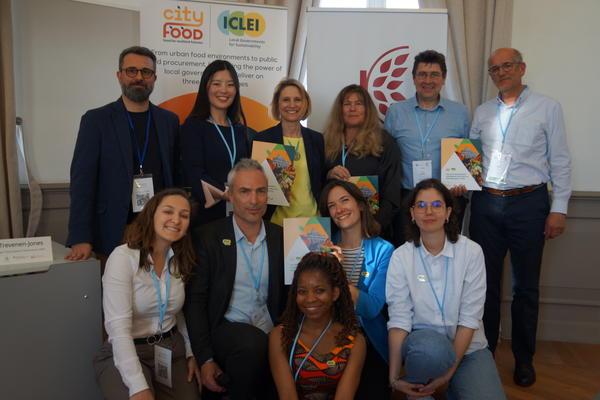Reimagining food markets: How cities across Europe and Africa can build resilient food systems

As the world grapples with escalating climate challenges and deepening inequalities, cities are increasingly turning to food markets as powerful engines for building resilience and social equity. At the Climate Chance Africa-Europe Summit in Marseille, France, the “Enhancing Urban-Rural Linkages for Resilient Food Systems” session, hosted by ICLEI CityFood on 31 March, brought together experts and leaders from across Europe and Africa to share their insights.
The event highlighted real-life cases like the TerrAsol project in Montpellier, France, which fosters food democracy and solidarity across the territory by mobilizing actors to improve access to quality food and enhance living conditions. In Beira, Mozambique, the 2035 Master Plan has strengthened market management, water supply, sanitation, and urban infrastructure. Since 2019, post-Cyclone Idai recovery efforts have focused on rehabilitating public food markets, promoting food safety, and establishing inclusive governance in Munhava, Massamba, and Gorjao—Beira’s most populous and disadvantaged areas.
Opening the discussion, Corinna Hawkes, Director, Agrifood Systems and Food Safety Division, FAO, emphasized that cities must approach storytelling with authenticity and humility, valuing shared learning over mere promotion of achievements:
“Cities need to tell a story with humility. People can make mistakes and change their minds. Most times it comes as a showing-off thing, and it shouldn’t be like that. People should tell their stories and have agency that their story is worth telling. It is not about Europe teaching something to the rest of the world, it is often the other way around.”
The panel also highlighted the transformative role of food markets in influencing consumer behavior, improving nutrition, and reducing environmental impacts. Nicolas Bricas, Researcher, CIRAD and Director, UNESCO Chair on World Food Systems, noted that genuine change requires creating environments that support healthier behaviors and provide opportunities for skills development.
“The idea is to change consumer behavior to improve nutrition, reduce the environmental impacts of the food system. We don’t want to just raise awareness, we want to change the environment. We need to train women and young vendors, and improve the market’s infrastructure.”
Connecting regions through stronger networks is also essential to achieving resilient food systems. Through a video intervention, Wilber Kakaire, AfriFOODlinks City Coordinator, Mbale, Uganda, stressed, “We need the kind of information that creates avenues to strengthen food markets between Africa and Europe.”
Giame Berti, Chair, Resilient Local Food Supply Chains Alliance, emphasized the need for scaling up direct-to-consumer connections. “We need to support direct connections from producer to consumer but also understand how to scale up and guarantee that these producers can supply schools or restaurants.”
The session highlighted the strategic importance of markets as resilience hubs where community needs intersect with broader governance mandates. According to Ann Trevenen Jones, Technical Manager: Food Systems Governance, GAIN, markets offer unique opportunities for addressing multiple challenges simultaneously.
“City governments and local and traditional food markets are strategic partners to realize locally led resilience. Multiple government mandates meet in markets which are mini food environments of livelihoods and nourishment; providing experiential and vital connections to many food places in the food system in the routine of daily life.”
In addition, Jiwon Lee, Principal Co-Lead of Global CityFood Program, ICLEI, called on policymakers to reimagine food markets as essential components of urban resilience, social inclusion, and innovation.
“The food markets are underestimated by policymakers, while their potential goes beyond providing food - they are an essential part of the city’s social fabric. We urge everyone to reimagine food markets - not as outdated or informal spaces - but as dynamic urban hubs fostering innovation and inclusivity.”
Launch of the CityFood Market Handbook for Healthy and Resilient Cities
A key moment of the session was the official launch of the CityFood Handbook for Healthy and Resilient Cities, which provides local governments with practical guidance to transform food markets into inclusive, resilient spaces that enhance urban food security, nutrition, and livelihoods.
With 16 real-world case studies spanning cities across Africa, Asia, Europe, and the Americas, the Handbook provides actionable strategies to reimagine markets as inclusive, sustainable, and community-centered spaces. Download the Handbook here.
Peter Defranceschi, Head of Global CityFood Program, ICLEI, said, “The launch of our Handbook marks the culmination of a transformative journey across these 16 cities. For instance, in Lilongwe, Malawi, and Lusaka, Zambia, open-air food markets provide nutritious, affordable, locally-grown produce to the most vulnerable communities. Their impact goes far beyond food access—it's about diversity, solidarity, and inclusive governance. This clearly shows the multi-functional benefits of fresh food markets."
The event demonstrated how collaboration, inclusivity, and knowledge exchange are essential for building resilient food systems. By integrating lessons from across continents, cities can better prepare for climate challenges while promoting social and economic equity.
As the insights shared in Marseille make clear, food markets are more than commercial spaces—they are vibrant ecosystems that connect people, strengthen urban-rural linkages, and drive innovation. With tools like the CityFood Market Handbook for Healthy and Resilient Cities, local governments have the opportunity to transform food systems for a healthier, more resilient future.
Publishing date:
